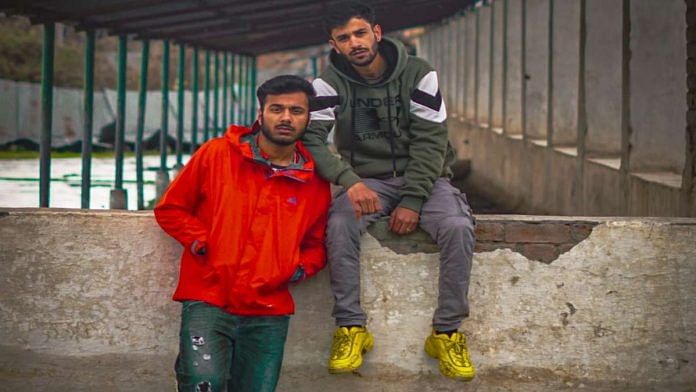Srinagar: For Arsalan Afreen, a 22-year-old hiphopper from Srinagar, “Aatankki” is not so much a stage name as a protest against what he sees as the “criminalisation of Kashmiris” in other parts of India.
The word “Aatankki” means terrorist in Hindi. It was the moniker Afreen courted during his days at a boarding school in Punjab, and he wants to take the punch out of a word once lobbed at him for the simple reason that he hails from a “troubled place”.
“I wanted to use the name given to me (Aatankki) as my stage name because this subliminally shames anyone who thinks they can criminalise Kashmiris by calling them terrorists,” he told ThePrint.
Afreen is a new entrant on the music scene. Together with his partner Tufail Nazir, also in his early 20s, he is riding a wave of hiphop revival in the Valley.
Their first song together, “Khoon Rezi (bloodshed)” was received well among Kashmir’s social media users, especially on the music app Spotify.
Talking about the bloodshed Kashmir has been witnessing for the past 70 years, and the resilience “mountain people” or the “pahadi” have displayed, the song put the duo on the map.
Mixed and mastered by fellow artiste Ahmer, the rap was received well and the warm response the duo received on social media prompted them to solidify their collaboration. They have decided to call their collaboration “SOS”, which stands for “Straight Outta Srinagar”.
Also Read: Transgenders, GOT superfans & teen singers: ‘Humans of Kashmir’ get a voice on Facebook
Why Aatankki?
Their growing success apart, it’s Afreen’s stage name that evokes immediate curiosity. But the name isn’t just a throwback to Afreen’s “past”, it is also his answer to anyone who may want to put a label on him in the days ahead.
“I don’t have any grudges against my batchmates. Towards the end of my high school, it had just become an inside joke. But when time came to pick a stage name, I decided to use Aatankki because five, 10 years down the line, when I am producing songs… the trend of branding Kashmiri as terrorists will stay,” he said. “They would have called me Aatankki anyway,” he added. “By naming myself that, I am taking that joy away from them.”
Nazir, all of 21, entered the world of hiphop a little earlier than Afreen. Currently a student of economics in a Chandigarh college, Nazir’s first exposure to hiphop came when he heard American rapper Tupac Shakur, a master of his craft who died before either of the two SOS members was born.
After he left Kashmir to pursue his Bachelor’s, Nazir said, he also came to know about Indian hiphop culture and “I was soon writing poetry that would later take the form of lyrics”.
On 4 June, Afreen and Nazir released their second song on social media in collaboration with a Mumbai-based rapper Yogie. Titled “Beta Naaz Hai”, the song is described as a “form of bragging” by the duo. The song, Nazir said, highlights the need for better use of lyrics by aspiring rappers. “We are bragging about other rappers who sound wack,” said Nazir, employing a slang term for “bad”.
Straight Outta Srinagar
Kashmir’s first hiphop star of its own emerged from a churn in the Valley.
Roashan Illahi, who went by the name of MC Kash, became popular with his rap “I protest”, which followed the 2010-11 protests triggered by the killing of a local teenager named Tufail Mattoo.
Tufail was allegedly killed by a tear gas shell thrown by security forces to quell protests that started after the controversial Machil encounter.
Mir Gazanfar (29), a rapper himself, said it was very important for hiphop ventures like SOS to raise socio-political issues, adding that depoliticising hiphop is detrimental to the art form.
Nazir and Afreen feel the same way, but they have a clear vision about how they want to do it.
“There is a lot that has happened in Kashmir that can be talked about and hiphop is one of the many mediums through which this can be done,” said Nazir.
“But the medium has to be understood properly, its context, its history and more importantly the use of words cannot be sub-standard,” he added.
“After the initial bout of rap music that surfaced in Kashmir, the art form was somehow hijacked and replaced with a lot of cringe material that you see on social media websites. Social issues and the politics of this place took a back seat. I see our work as an attempt to bring back the hiphop culture that began a decade ago, where social issues and politics were not taboo,” he added. “Although there are still pressures on us as to what to say and what not to say, we will try our best to say what needs to be said.”
Also Read: This Kashmiri Sikh is using music to cross national and religious divides



